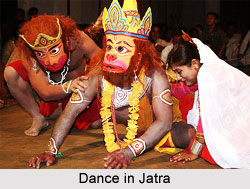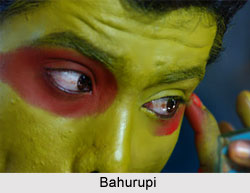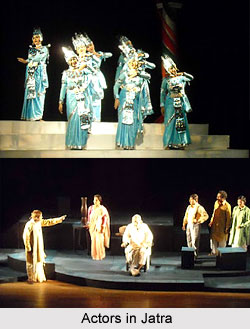 Repertoire of Jatra is varied, and adds flavour to the art form. Jatra is an art form, a folk dance drama from the Indian state of West Bengal, and over the years it has been successful in entertaining people through intense acting and appropriate musical sequence. The word "jatra" depicts a journey, and it is replete with various Hinduism and Bakti cult philosophy. During the times when there were no stages in Bengali theatre, jatra played a crucial role as it evolved as a main force of entertainment for people. The jatras were mainly devoted to songs, dances and acting out scenes from mythology.
Repertoire of Jatra is varied, and adds flavour to the art form. Jatra is an art form, a folk dance drama from the Indian state of West Bengal, and over the years it has been successful in entertaining people through intense acting and appropriate musical sequence. The word "jatra" depicts a journey, and it is replete with various Hinduism and Bakti cult philosophy. During the times when there were no stages in Bengali theatre, jatra played a crucial role as it evolved as a main force of entertainment for people. The jatras were mainly devoted to songs, dances and acting out scenes from mythology.
Devotes and followers like Rupa Goswami and Ramananda Rai, after Chaitanya, indulged in writing plays based on life and sayings of Lord Krishna. Gradually, it materialized into writing and performing traditional plays with stories of Lord Rama, Sita and Lord Shiva taken from great epics like the Mahabharata and Ramayana, and even Indian Puranas, and other historical tales and folklores.
In order to carry out a successful performance there are certain aspects that needs to be taken care of. Some of the essential aspects of repertoire of jatra are discussed below!
Bahurupi in Jatra
Bahurupi, a multi formed actor, play a crucial role in folk drama. These are group of Bengali folk performer who play the role of many characters, from gods to demons, from animals to lepers, engineers to doctors, birds and children, professional men, holy men and tribal, rogues and tradesmen, fools and beggars. A Bahurupi can take on various forms and different identities. The repertoire ranges from Lord Rama, Lord Krishna, Goddess Kali and even demons like Ravana and Tarakas. The clothes of a bahurupi are known as "vesha".
A Bahurupi can take on various forms and different identities. The repertoire ranges from Lord Rama, Lord Krishna, Goddess Kali and even demons like Ravana and Tarakas. The clothes of a bahurupi are known as "vesha".
Actors in Jatra
Actors in jatra possess a sense of composition and art of speech delivery. He is greatly aware of the psyche of audience and looks graceful from all possible angels. There is action, flamboyance and speed. There is steep turn in mood and sudden flares and unexpected drops in sadness are depicted by orchestra. Drums thump and clatter and rumble. The trumpet and flute players add to the ambience through suitable notes. Background score, which Bengali cinema introduced in the 1930s, were first used in jatra. The singing is performed by actors and not by music players.
 For actors in jatra, the process of make up is crucial and each actor does his individual make up. They use amber grease, white lead and lamp soot to provide an oily sheen to the face. Brutal generals, demons and villains have complicated designs. Crisscross lines, black stripes, white knobs and read streaks transform actors into fiendish characters. The exterior of an actor is so unreal that it makes the audience conscious about the presence of theatrical reality. The use of make up is nifty and plays an important role in jatra.
For actors in jatra, the process of make up is crucial and each actor does his individual make up. They use amber grease, white lead and lamp soot to provide an oily sheen to the face. Brutal generals, demons and villains have complicated designs. Crisscross lines, black stripes, white knobs and read streaks transform actors into fiendish characters. The exterior of an actor is so unreal that it makes the audience conscious about the presence of theatrical reality. The use of make up is nifty and plays an important role in jatra.
Actors of jatra come from various backgrounds, unlike in folk theatres like Bhavai Raslila and Tamasha where actors come from special castes. Conventionally, in jatra, all roles have been played by male actors. Some play vicious villain, young heroes, some vivek (conscience), some comic fools and some specialize in female roles. However, in the recent times, there are women who are active part of jatra.
Music in Jatra
Music in Jatra is essential in creating the mood of a situation. The classical and folk musical personalities come together in folk theatres. The songs related to prayers, the mood song and also the songs related to separation invariably have classical touches to it. The songs and music of Jatra have over the years become intricate with the rampant use of erotic dance moves and songs. In case of jatras the musical instruments that are used include dholak (type of drums) and pakhawaj, violin.
Vivek in Jatra
The system of juri continued till the first decade of 20th century, but later, in the next decade people were bored with the juri system, because of long hours taken for the process. The system of Vivek was introduced in the year 1911 in the play Padmini ("The Self-Immolation of Queen Padmini") by Haripada Chatterjee, which the company was rehearsing at that time.
Vivek is a character that can appear in any given scene- in king`s court, in hell, in heaven, in forest and in street. Vivek, meaning "conscience", also enjoys unadulterated freedom. As a character does something wrong in the play, Vivek tuns up to warn through a song! He possesses a particular dramtic function. He expresses his views through a song, and plays everyone`s shadow and also delivers commentary of the situation. He lives in present, past and also future.




















